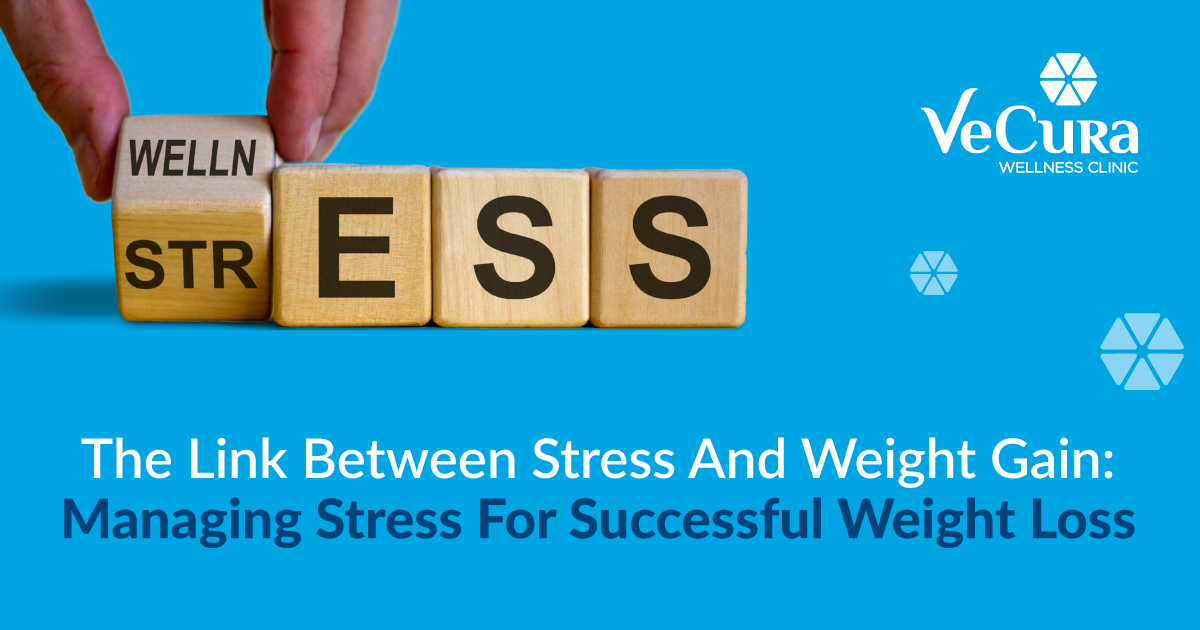In this fast-paced and demanding world, stress has become pervasive in our daily lives, impacting both our mental and physical well-being. Understanding the link between stress and weight gain is crucial for successful weight management.
Research suggests that stress triggers physiological responses that can disrupt our appetite, lead to emotional eating, and even affect our metabolism. In this blog, we will explore the connection between stress and weight gain and provide practical strategies for effectively stress management for weight loss.
Stress and Weight Gain: The Role of Cortisol
Cortisol, also known as the “stress hormone,” is crucial in the connection between stress and weight gain. When we are stressed, cortisol is released by the body as part of its natural stress response.
Elevated cortisol levels can significantly impact our metabolism and appetite management. Cortisol causes increased hunger, especially for high-calorie, sweet, and fatty foods, thus encouraging us to consume junk food.
Furthermore, cortisol stimulates fat storage, especially around the abdomen, which can result in weight gain over time. Understanding the role of cortisol in weight gain is critical for properly managing stress and developing interventions to support healthy weight management.
How Stress Affects Your Body
Stress is an inherent aspect of life, with consequences that extend beyond mental and emotional well-being. Not many of us know that stress also impacts our physical health, such as our eating habits and metabolism.
Hormones like cortisol and adrenaline trigger a series of physiological responses that can significantly impact our bodies.
1. Eating Habits

Stress can disrupt our eating habits in several ways. Some individuals turn to food for comfort, leading to emotional eating. The reason you crave chocolates, cakes, pizza, and more whenever you’re stressed is all the work of cortisol hormones!
Since these stress hormones frequently cause cravings for high-calorie, sweet, and fatty meals, it can result in weight gain over time. On the other hand, others may feel a loss of appetite or engage in mindless eating, eating without concern for hunger or fullness cues. These poor eating habits might lead to weight gain and trouble losing weight.
2. Metabolism

Stress has a direct impact on our metabolism, which influences how our bodies convert food into energy.
Even if you’re not consuming foods rich in fat and sugar, cortisol can still hinder your metabolism, posing difficulties in weight loss. Chronic stress can also throw off the balance of other hormones involved in metabolism, which may result in metabolic problems and weight gain.
The Risks Associated With Stress-Induced Weight Gain
Stress-induced weight gain is dangerous to one’s physical and mental health. It is critical to understand these risks to realise the importance of stress management for successful weight loss.
These are some risks you may want to be aware of:
Excessive weight gain, particularly around the abdominal area, increases the likelihood of developing serious health conditions, such as:
- Cardiovascular disease
Type 2 Diabetes
- High blood pressure
- The accumulation of visceral fat, triggered by stress hormones, can lead to inflammation and metabolic dysfunction.
In addition to physical health risks, stress-induced weight gain can also have adverse effects on mental well-being, contributing to:
- Low self-esteem
- Depression
- Anxiety
Furthermore, there is evidence linking obesity to several cancers, including pancreatic, oesophagal, colon, breast, and kidney cancer.
10 Points To Stress Management For Weight Loss
Now that you have understood the link between stress and weight gain, it’s time to look at how to overcome and reduce the fat caused by such stress. Here are the ten most common yet highly important steps you need to follow regularly,
10. Regular Exercise

Exercise, such as cardio exercises, strength training, or yoga, releases endorphins, improves mood, and promotes overall health. And, of course, it also helps in weight loss by burning calories and increasing metabolism.
Tips: Also check the How to Lose Belly Fat | What Works and What Doesn’t
9. Sufficient Sleep

Sleep deprivation can elevate stress hormones and affect hunger-regulating hormones, resulting in weight gain. To help with stress management and weight loss, aim for 7-9 hours of uninterrupted sleep each night.
Tips: Also check the How to Reduce Stress And Weight Gain?
8. Healthy Nutrition

Maintaining a well-balanced diet rich in fruits, vegetables, lean proteins, and whole grains provides essential nutrients for the body and supports overall well-being. Healthy eating improves blood sugar levels, increases energy levels, and enhances mood, all contributing to successful weight loss.
Tips: Also check the Superfoods for Weight Loss: Incorporating Nutrient-Rich Foods into Your Diet
7. Staying Hydrated

Staying hydrated by drinking adequate quantities of water throughout the day is vital for stress management and weight loss, as dehydration can contribute to higher stress levels, fatigue, and cravings for unhealthy snacks. As you follow the above four tips every day, you can also manage stress in other ways.
6. Practising Mindful Eating

Savor each bite, eat slowly, and completely engage your senses to enhance your eating experience. Mindful eating reduces stress-related overeating and improves digestion, leading to weight loss.
Tips: Also check the How Can a Vegan Diet Help You Lose Weight?
5. Incorporating Aromatherapy

Calming essential oils such as lavender, chamomile, and bergamot can be diffused, applied topically, or added to a bath to create a relaxing environment.
4. Engaging in Creative Outlets

Explore creative hobbies such as painting, writing, and playing an instrument. These outlets offer a healthy escape, encourage self-expression, and relieve stress, all of which contribute to successful weight loss.
3. Cultivating a Supportive Social Circle

Surround yourself with people who are encouraging and supportive of your weight loss journey. Sharing your experiences, getting advice, and receiving support from like-minded people can help you manage stress and boost your chances of successful weight loss.
2. Exploring Relaxation Techniques

Experiment with different relaxation techniques like deep breathing exercises, progressive muscle relaxation, and guided imagery. These approaches induce relaxation, alleviate stress, and help manage emotional eating triggers.
1. Practising Gratitude

Incorporate a daily gratitude practice into your routine. Reflecting on your gratitude can shift your mindset, reduce stress, and enhance your overall well-being.
Following these tips can positively impact your weight loss journey as you start to feel better about yourself, your body, and your mind. And once your stress levels are reduced, you can automatically lose weight more easily!
Check Out VeCura Wellness For a Safe Weight Loss Journey!
Stress-induced weight gain can be a common struggle for many individuals. If you’re looking to shed those extra pounds safely and healthily, we are here to help!
VeCura Wellness is a weight loss clinic with a team of experts offering tailored solutions to fit your lifestyle and meet your weight loss goals.
At VeCura Wellness, you can expect a range of services that cater to your needs, including body contouring and tummy reduction. Our experienced wellness experts are dedicated to providing personalized consultations to ensure that you receive the best possible guidance and support.
VeCura Wellness offers personalised weight loss, inch loss, and body contouring treatments at their clinics across major cities in India:
- Pondicherry
- Chennai – T Nagar
- Chennai – Anna Nagar
- Chennai – OMR
- Chennai – Porur
- Chennai – Chromepet
- Coimbatore
- Trichy
- Madurai
- Salem
- Vellore
- Erode
- Malakpet
- AS Rao Nagar
- Medipally
- Kukatpally
- Visakhapatnam
- Vijayawada
- Tirupati
Conclusion
The link between stress and weight gain is a complex and significant issue that affects many individuals seeking weight loss. Understanding this link can help achieve successful weight loss while nurturing a healthier mind and body.
You can reduce stress levels and improve overall well-being by incorporating self-care practices, such as mindfulness exercises and regular physical activity.
Seeking social support and professional guidance from a weight loss expert like VeCura Wellness can also provide valuable resources for managing stress effectively.
Note: To explore more engaging content and stay connected, feel free to visit VeCura Wellness YouTube channel for exciting videos, insightful discussions, and much more.
Stress Management For Weight Loss: FAQs
1. Can stress or anxiety cause weight gain?
Anxiety’s effects on the body’s cortisol levels increase belly fat, contributing to weight gain. The longer you are under stress and anxiety, the more weight you can potentially put on.
2. How do you lose stress fat?
Effective stress management techniques and regular exercise will help you lose fat. Get enough sleep, practice mindfulness or meditation, and engage in cardio and strength training activities.
3. What is a stress belly?
Abdominal obesity is linked to high amounts of cortisol, the main stress hormone. Stress belly is a symptom of how stress and stress hormones impact your weight, particularly belly fat.



